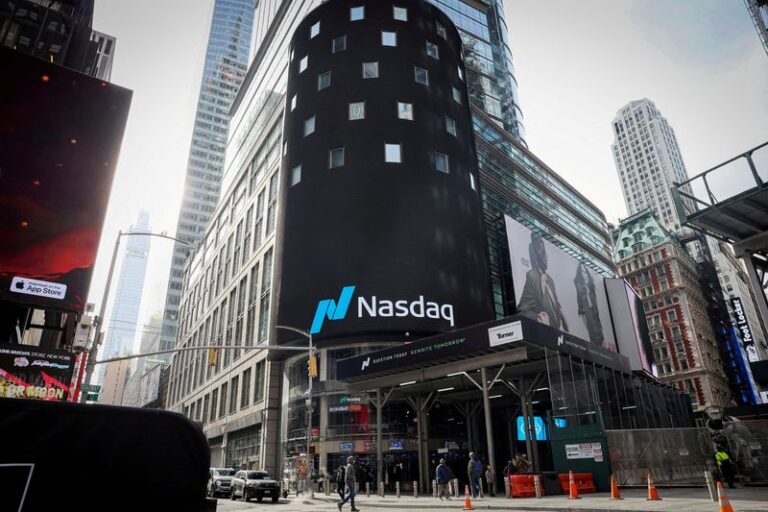Ankika Biswas and Lisa Pauline Matakal
(Reuters) – Wall Street fell on Wednesday, with the tech-heavy Nasdaq leading the decline after disappointing quarterly results from Tesla and Alphabet raised doubts about the sustainability of the tech- and AI-driven rally in stocks in 2024.
Electric car maker Tesla reported its lowest profit margin in more than five years and missed second-quarter profit expectations, sending its shares down 11.2% and putting the company on track to lose more than $83 billion in market capitalization from Tuesday’s closing price if losses continue.
Google parent Alphabet also fell 4.1 percent despite reporting better-than-expected second-quarter profit as investors focused on slowing advertising growth and the company warned of high capital spending this year.
Alphabet’s losses highlighted the high return levels of the so-called “Magnificent Seven” big tech stocks, which have posted double- to triple-digit percentage gains so far in 2024, buoyed by optimism about the adoption of AI and hopes that the Federal Reserve will start cutting interest rates soon.
“It’s hard not to think that if the tech sector sneezes, it could infect the entire market,” said David Morrison, senior market analyst at TradeNation.
Other large stocks also fell, with Microsoft, Amazon.com Inc, Meta Platforms Inc and Nvidia Corp falling between 0.8% and 2.9%.
Market participants, wary of the high valuations of these companies, began shifting their investments to underperforming sectors from mid-July. Morrison warned that a general selloff in large caps could drag down the broader market.
“If there is an outflow from the tech sector, it’s going to be on a pretty dramatic scale. I don’t think investors’ first reaction will be to immediately reallocate that money into small and mid-cap stocks,” Morrison said.
The Russell 2000 index of small-cap stocks fell 0.3% after gaining 1% the previous day, while results from Tesla and Alphabet helped drag the communication services and consumer discretionary sector indexes down more than 2% each.
In economic data, S&P Global’s flash U.S. composite PMI production index showed business activity hit its highest level in 27 months in July.
Friday’s figure for personal consumption expenditures, the Federal Reserve’s preferred inflation gauge, will be the most closely watched economic data of the week.
Traders broadly expect the Fed to cut rates by 25 basis points by September and two more cuts this year, according to LSEG data.
As of 9:51 a.m. ET, the Dow Jones Industrial Average was down 203.99 points, or 0.51%, to 40,154.10, the S&P 500 was down 64.25 points, or 1.16%, to 5,491.49 and the Nasdaq Composite was down 328.36 points, or 1.82%, to 17,669.00.
In other revenue, AT&T rose 3.6 percent as wireless subscriber growth beat expectations.
Visa was the biggest faller in the Dow, dropping 3.9% after reporting weaker-than-expected third-quarter revenue growth.
Solar inverter maker Enphase Energy rose 7.4% after reporting better-than-expected second-quarter operating profit, while General Dynamics fell 5.1% after second-quarter business jet deliveries fell short of expectations.
Rivian Automotive fell 6.3% after the electric-vehicle maker faced trial on charges it encouraged defecting Tesla employees to steal trade secrets.
Declining issues outnumbered advancing ones on the NYSE by a 1.31-to-1 ratio, and on the Nasdaq by a 1.48-to-1 ratio.
The S&P index posted nine new 52-week highs and three new lows, while the Nasdaq posted 58 new highs and 33 new lows.
(Reporting by Ankika Biswas and Lisa Matakkal in Bengaluru; Editing by Varun HK and Pooja Desai)


